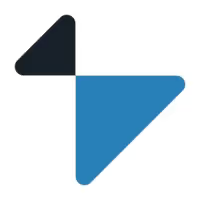AnyBiz Alternatives
A direct comparison of 10 AnyBiz alternatives. We analyze features, pricing, and use cases to help you choose the right platform for your business.

You might use AnyBiz for its strong automation. Its AI sales agents do a good job with outreach, making it a solid choice to automate lead generation without growing your team. This is a common reason people pick this tool.
But no tool is perfect. Some users find it expensive, the UI clunky, or data occasionally inaccurate. We analyzed top alternatives, comparing their pros and cons to AnyBiz, to help you shortlist your options. Let's get started.
Recruit Digital Workers With 11x
If your goal is to add digital workers to your sales efforts, consider 11x. The platform provides autonomous agents designed to manage a range of sales tasks. This approach can help you expand your sales capacity without growing your team.
11x is a GTM platform that uses AI agents to manage the sales process. It unifies data enrichment, outreach, and email warmup, which means you do not need separate point solutions for these tasks.
Its agent, Alice, finds prospects, runs outreach on email and LinkedIn, and keeps the CRM updated. A second agent, Julian, qualifies inbound leads and books meetings for your team.
AnyBiz Alternatives
Below, we review the top alternatives to AnyBiz. Each review covers main features, pricing, and how the tool compares to AnyBiz, helping you find the right fit for your sales team.
1) Outreach
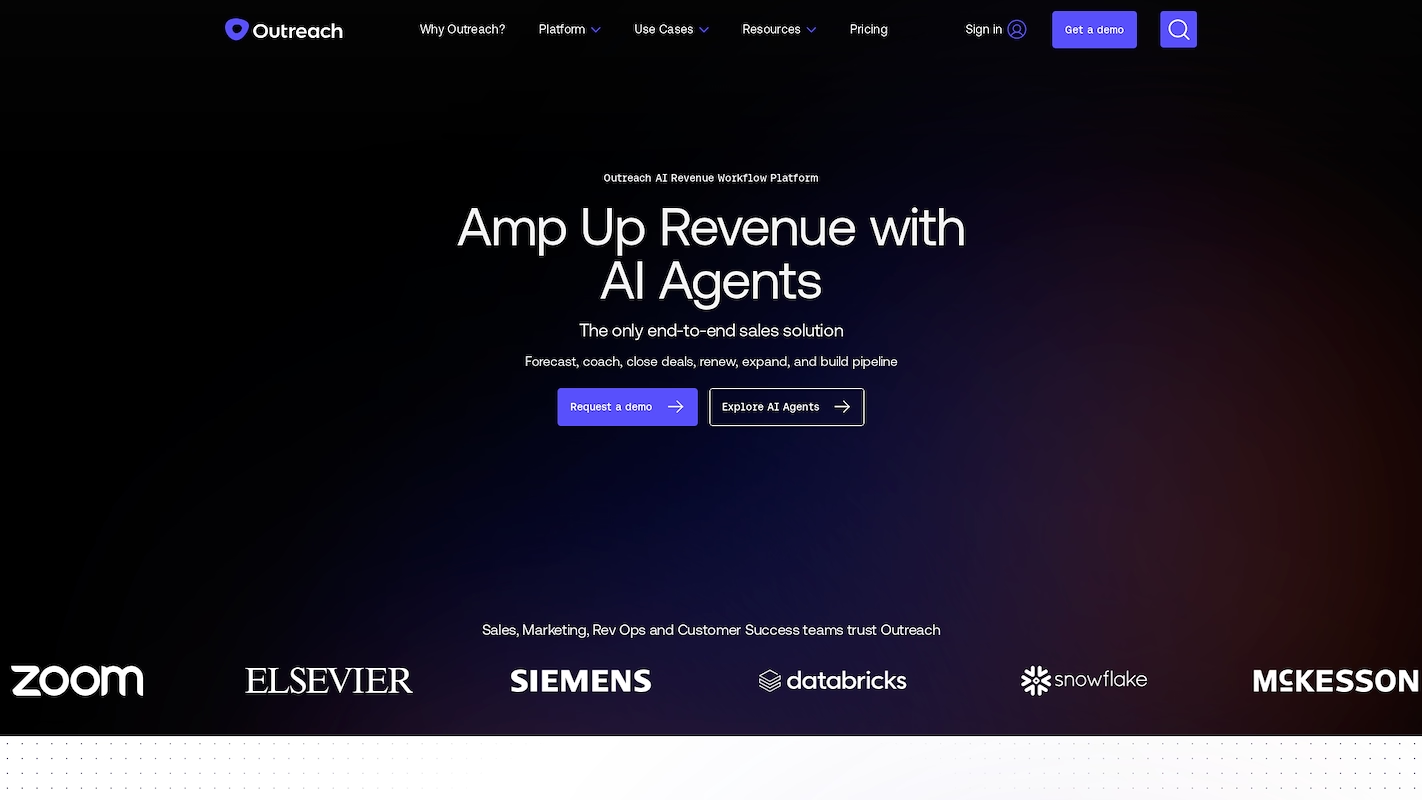
Outreach is an AI platform for revenue teams that offers end-to-end sales execution. It uses AI agents and data workflows to help teams forecast revenue, coach reps, close deals, and manage renewals. The platform focuses on security and governance for customer data.
Common uses include the organization of business books, outbound communication to build pipeline, and deal management with AI insights.
Outreach's Main Features
- Provides AI-driven rep coaching through its tool, Kaia, which offers meeting summaries and analytics.
- Surfaces risks, next steps, and recent activity on any deal with Smart Deal Assist.
- Detects topics and sentiment across meetings, calls, and emails with buyer-sentiment analysis.
- Offers real-time content guidance during live meetings with prompts and content cards via Kaia.
How Outreach Compares to AnyBiz
Average Review score: 4.3/5 stars based on 3,479 G2 reviews.
- Outreach provides AI-driven rep coaching through its Kaia tool for live meeting guidance. This focuses on rep performance, while AnyBiz centers on task automation.
- Its Smart Deal Assist feature helps manage deals by identifying risks and next steps. This function provides deal intelligence, which is different from the lead generation focus of AnyBiz.
- The platform analyzes buyer sentiment from calls and emails. This offers qualitative insights that are not a core part of AnyBiz's quantitative outreach reports.
- Outreach acts as a unified platform for sales engagement and revenue operations. This contrasts with AnyBiz, which is a more specialized tool for automating outreach.
Outreach vs. AnyBiz: Potential Downsides
- Outreach provides AI assistance for reps, not fully autonomous agents like AnyBiz. This means your team remains directly involved in outreach tasks.
- Some users report the platform can be slow to load. This might cause small delays in daily sales activities, a friction point less relevant to AnyBiz's automated, backend processes.
- Its integration with certain CRMs, like HubSpot, sometimes presents sync challenges. This can complicate data consistency, whereas AnyBiz's focused automation may offer a simpler data flow.
Budget and Pricing Considerations
Outreach does not publish its pricing, but user reviews indicate it is a premium-priced platform with a reported 11-month ROI. AnyBiz, in contrast, offers a pay-for-results model and a 3-month ROI. For an exact quote from Outreach, it is best to contact them through their official website.
2) Salesloft
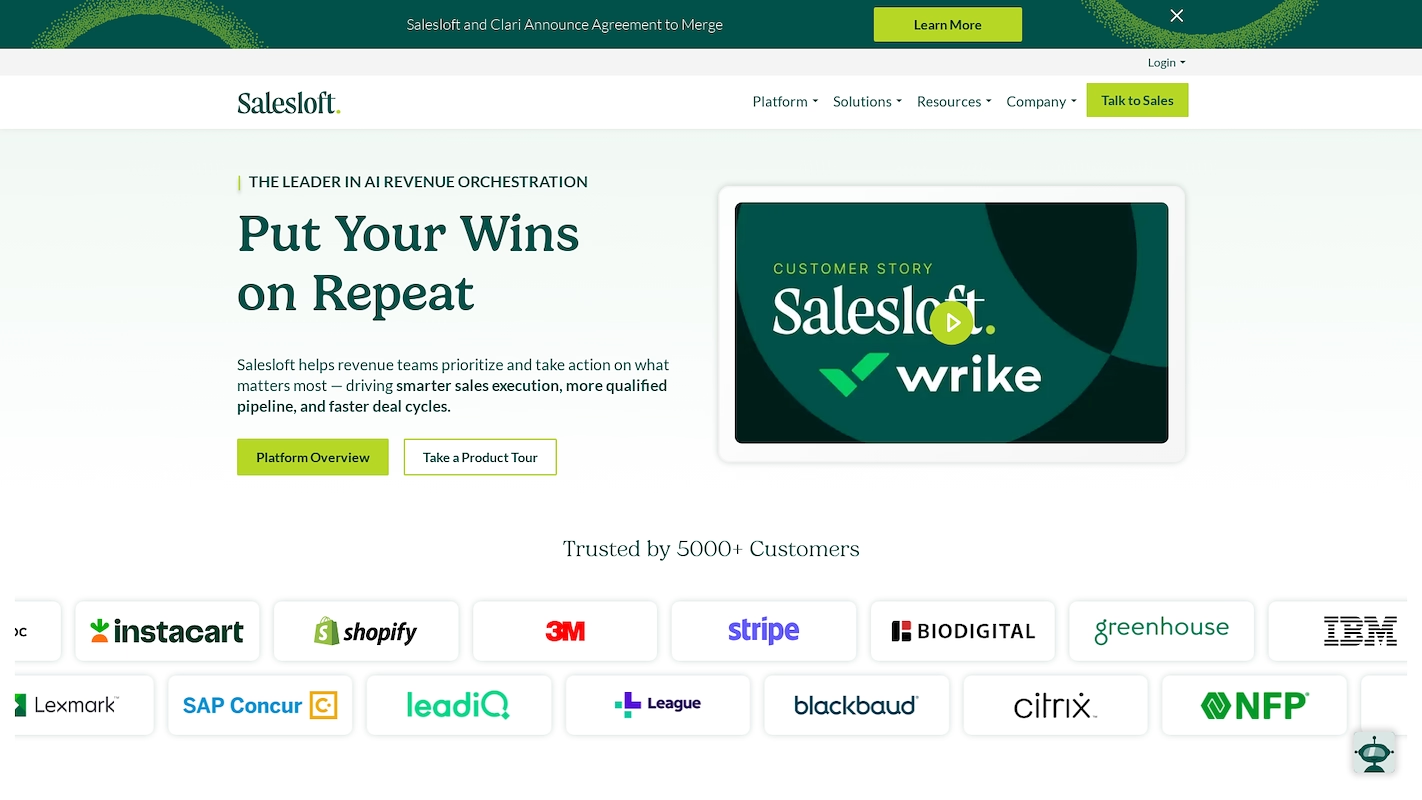
Salesloft is a Revenue Orchestration Platform that aligns sales engagement, AI insights, and deal management in a single workflow. Its AI agents surface buyer signals, prioritize actions, and automate tasks. This helps teams build qualified pipeline, shorten deal cycles, and forecast with more confidence. Common uses include pipeline creation and opportunity acceleration for revenue teams.
Salesloft's Main Features
- Prioritizes next-best actions for sellers using an AI engine called Rhythm.
- Generates buyer and seller insights from recorded calls for coaching and performance improvement.
- Provides deal and pipeline management with AI insights into risk, next steps, and velocity.
- Combines real-time deal data with AI and seller input for more accurate forecasting.
How Salesloft Compares to AnyBiz
Average Review score: 4.5/5 stars based on 4,145 G2 reviews.
- Salesloft uses its AI engine, Rhythm, to suggest the next best actions for sales reps. This differs from AnyBiz, which automates the outreach process with AI agents.
- The platform offers sales coaching features by analyzing insights from recorded calls. This focuses on rep development, an area not covered by AnyBiz's task automation.
- It provides AI-powered deal management to show risks and next steps. This is a contrast to AnyBiz, which centers on lead generation rather than managing existing deals.
- This tool helps with revenue forecasting by combining real-time deal data with AI analysis. AnyBiz does not have a comparable forecasting function, as it focuses on outreach automation.
Salesloft vs. AnyBiz: Potential Downsides
- Salesloft requires reps to manage their own outreach, even with AI assistance. This contrasts with AnyBiz, where AI agents run the entire outreach process, which can reduce the team's direct workload.
- Some users report that the platform's extensive features can make it complex to navigate. This is different from AnyBiz, which has a focused function on outreach automation and may present a simpler user experience for that specific task.
- Its reported 11-month return on investment is longer compared to AnyBiz's 3-month ROI. The platform's fixed pricing structure also differs from AnyBiz's pay-for-results model, which ties costs directly to performance.
Budget and Pricing Considerations
Salesloft does not publish its pricing, but its reported 11-month ROI suggests a higher investment than AnyBiz's 3-month ROI from its pay-for-results model. For an exact quote, visit Salesloft 's official website.
3) Apollo.io
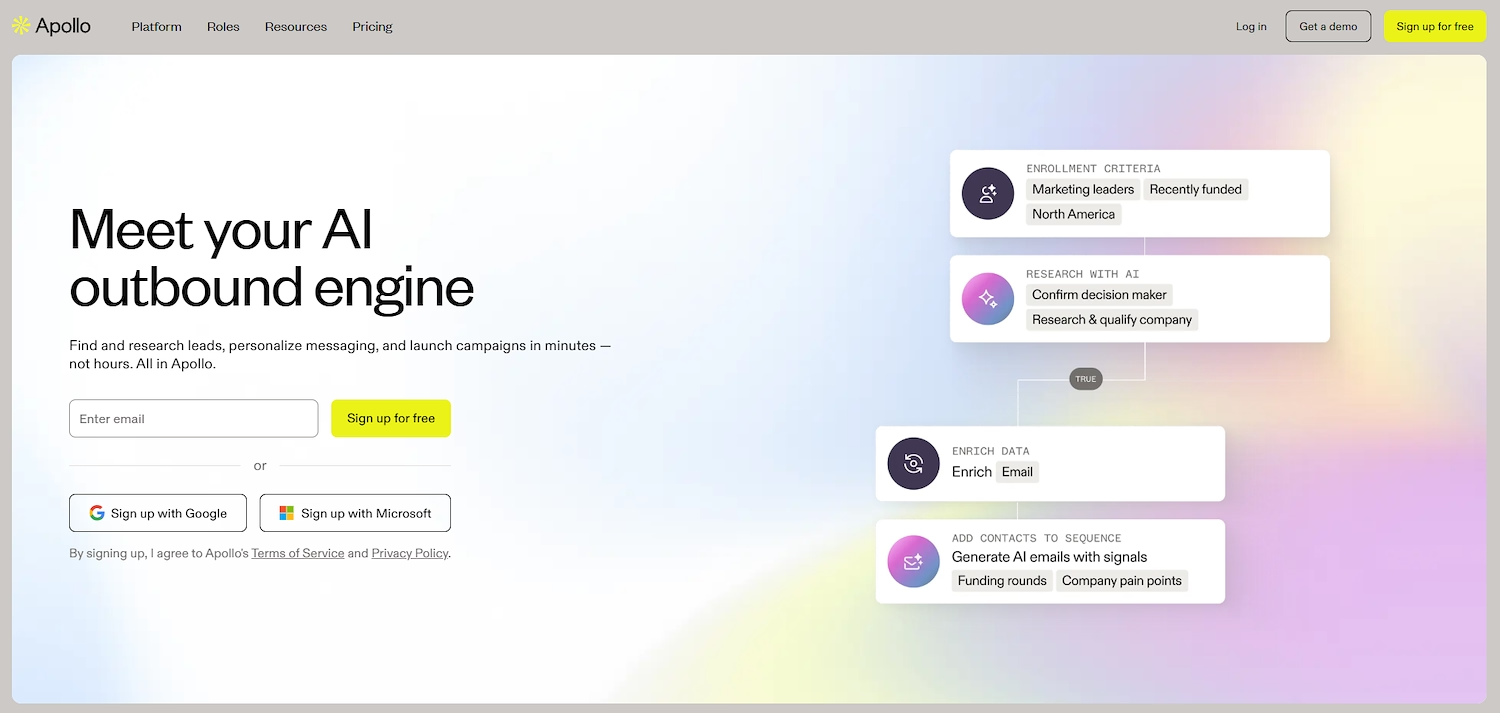
Apollo.io is a sales intelligence and engagement platform. It provides access to a large B2B contact database and tools for outreach. Teams use it to find prospects, engage them across channels, and manage their sales pipeline with data enrichment and sequence automation.
Common use cases include lead generation and outbound sales campaigns. The platform has functions that support AI SDR and AI cold call tasks.
Apollo.io's Main Features
- Provides access to a large B2B contact database for finding prospects.
- Offers tools for outreach and engagement across multiple channels.
- Includes data enrichment and sequence automation for pipeline management.
- Has functions that support AI SDR and AI cold call tasks.
How Apollo.io Compares to AnyBiz
Average Review score: 4.7/5 stars based on 8,904 G2 reviews.
- Apollo.io includes a large B2B database with over 210 million contacts. This feature offers a built-in data source, a function not central to AnyBiz's automation-focused model.
- The tool functions as an all-in-one platform that combines sales intelligence with engagement tools. This integrated approach differs from AnyBiz, which operates as a more specialized solution for outreach automation.
- Apollo.io offers lead enrichment tools to improve data quality. This gives teams direct control over data accuracy, a slight difference from AnyBiz, where the agent handles data as part of its automated process.
- Its pricing includes a free tier and several subscription levels. This provides more predictable costs compared to the pay-for-results model of AnyBiz, which ties expenses directly to campaign performance.
Apollo.io vs. AnyBiz: Potential Downsides
- Apollo.io requires a sales rep to manage its automation tools for outreach. This is different from AnyBiz, where autonomous AI agents run the entire process, which reduces the team's direct involvement.
- The platform is an all-in-one tool, which some users find complex if they only need outreach automation. AnyBiz provides a more specialized solution focused solely on that task, which can offer a simpler user experience.
- Its subscription-based pricing creates a fixed cost, regardless of campaign performance. This model is different from AnyBiz's pay-for-results structure, where costs are directly tied to the outcomes generated.
Budget and Pricing Considerations
Apollo.io offers predictable subscription pricing, with a free tier and paid plans starting at $49 per user monthly. This fixed-cost model is ideal for budget planning, unlike AnyBiz's variable pay-for-results structure. For detailed pricing, check Apollo.io 's official website.
4) HubSpot Sales Hub
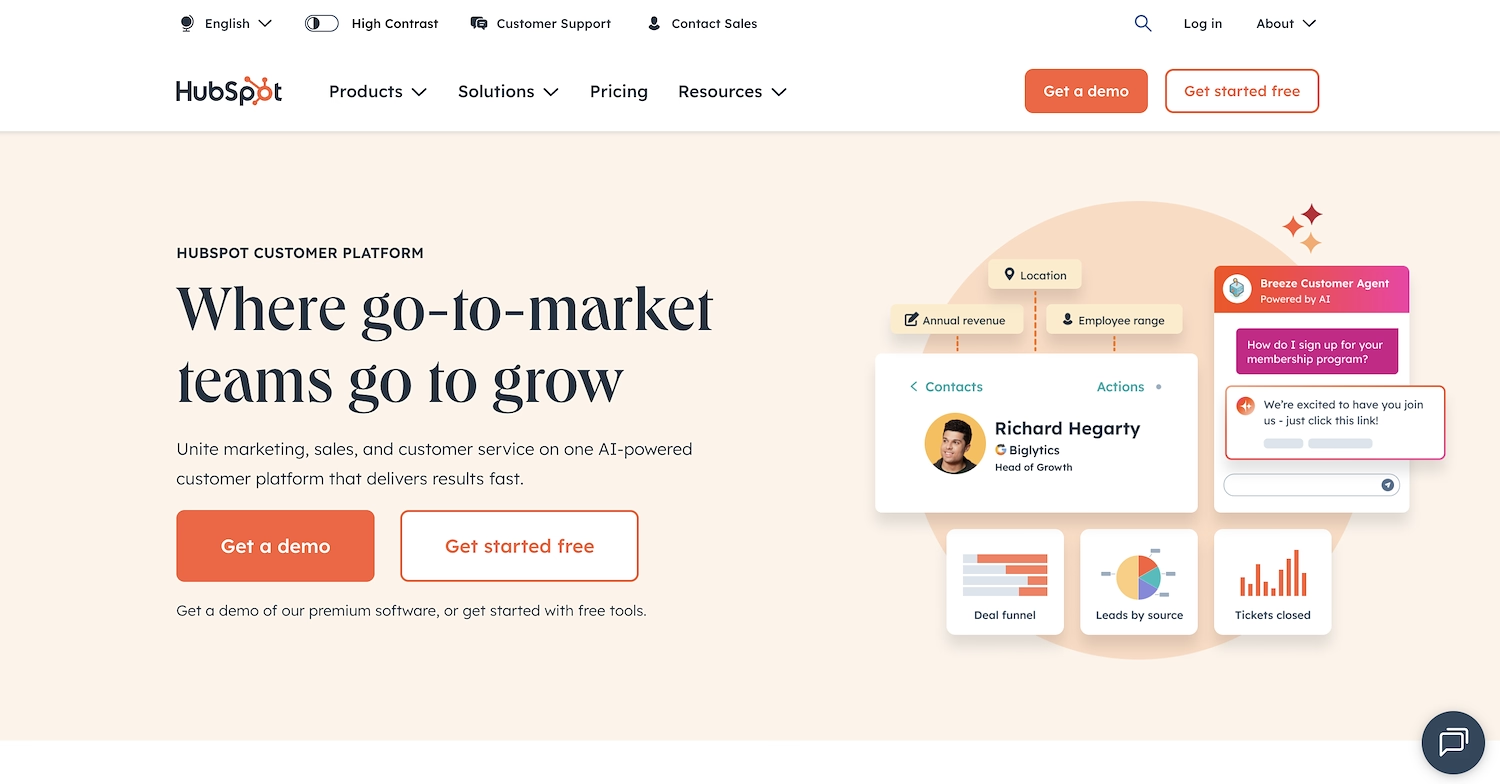
HubSpot Sales Hub is a sales software on the HubSpot CRM platform. It provides tools for sales engagement, deal management, and automation. The system helps teams connect with prospects, automate outreach, and manage their sales pipeline.
Common use cases include lead follow-up and communication. The platform centralizes sales activities to help teams close deals and deepen customer relationships.
HubSpot Sales Hub's Main Features
- Offers deal and pipeline management with tools for quote creation, e-signature, and payments.
- Provides sales enablement and coaching features, including playbooks, scripts, and coaching dashboards.
- Includes conversation intelligence with call transcription and AI-powered forecasting.
- Connects with over 1,700 marketplace apps and works with other HubSpot Hubs.
How HubSpot Sales Hub Compares to AnyBiz
Average Review score: 4.4/5 stars based on 12,407 G2 reviews.
- HubSpot Sales Hub is built on a native CRM, which unifies all customer data in one system. This is different from AnyBiz, a specialized tool that automates outreach and connects to a separate CRM.
- It provides sales enablement features like playbooks and coaching dashboards to improve rep performance. This contrasts with AnyBiz, which focuses on automating the rep's tasks instead of coaching.
- The platform manages the entire sales pipeline, from deal management to payment processing. This offers a broader scope than AnyBiz, which centers on the top-of-funnel lead generation stage.
- Its connection to the HubSpot marketplace offers access to over 1,700 apps. This provides more integration options compared to the more focused automation function of AnyBiz.
HubSpot Sales Hub vs. AnyBiz: Potential Downsides
- HubSpot Sales Hub assists reps with automation, but it does not offer fully autonomous agents like AnyBiz. This means your team remains responsible for managing and executing outreach campaigns.
- The platform is part of a large CRM ecosystem, which can be complex for teams that only need a dedicated outreach tool. AnyBiz offers a more focused solution specifically for automating lead generation.
- It operates on a fixed subscription price, which creates a predictable but rigid cost. This contrasts with AnyBiz's pay-for-results model, where your expenses scale directly with campaign success.
Budget and Pricing Considerations
HubSpot Sales Hub offers a subscription model with plans starting at $20 per seat monthly for its Starter tier. This fixed-cost structure provides predictable budgeting, unlike AnyBiz's variable pay-for-results model. For detailed pricing, check HubSpot Sales Hub 's official website.
5) LinkedIn Sales Navigator
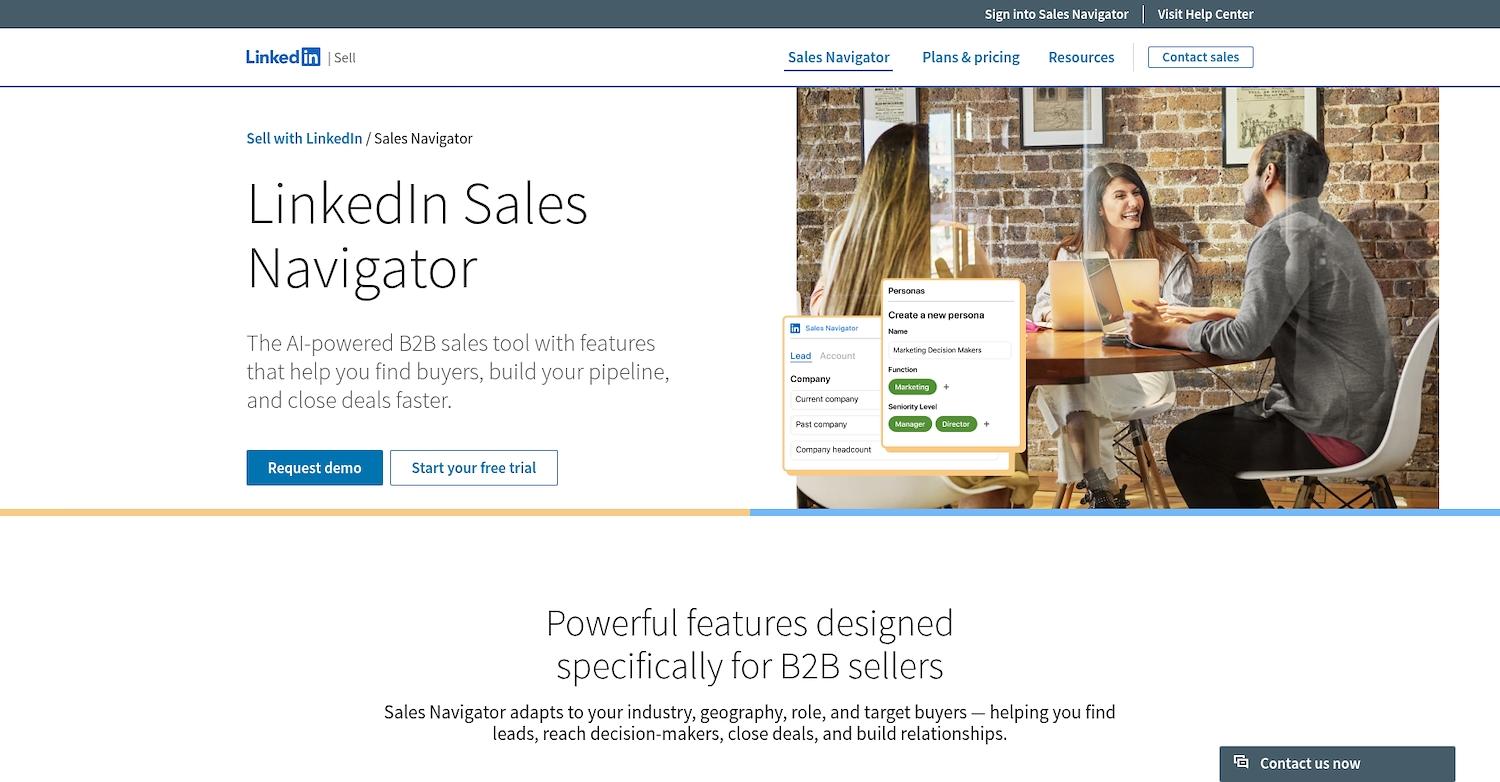
LinkedIn Sales Navigator is a sales intelligence tool that uses the LinkedIn network. It helps sales teams find prospects and decision-makers with advanced search and filter options. Teams use it to build lead lists for targeted outreach.
The platform allows reps to track buyer updates and get insights. It is a resource for account-based sales and to connect with potential buyers.
LinkedIn Sales Navigator's Main Features
- Offers advanced search and filtering to find prospects and decision-makers within the LinkedIn network.
- Allows for the creation of lead lists for targeted outreach campaigns.
- Tracks buyer updates and provides insights to support account-based sales strategies.
- Facilitates connections with potential buyers through LinkedIn's professional network.
How Sales Navigator Compares to AnyBiz
Average Review score: 4.3/5 stars based on 1,990 G2 reviews.
- LinkedIn Sales Navigator provides direct access to LinkedIn's network of over 860 million professionals for lead generation. This is different from AnyBiz, which automates outreach using data you provide.
- It offers advanced search and filtering to build precise lead lists. This gives users more control over targeting compared to AnyBiz, which focuses on automating the outreach process itself.
- The tool tracks real-time updates from buyers, like job changes, on the LinkedIn platform. This allows for timely and relevant outreach, a feature not central to AnyBiz's automation model.
- This platform focuses on sales intelligence, helping teams find and research prospects within LinkedIn. AnyBiz, in comparison, is an execution tool designed to automate outreach campaigns.
LinkedIn Sales Navigator vs. AnyBiz: Potential Downsides
- LinkedIn Sales Navigator helps find prospects but does not automate outreach. Your team must run campaigns manually, unlike with AnyBiz, where AI agents execute the entire process.
- Its data and outreach capabilities are primarily tied to the LinkedIn network. This offers a more limited scope compared to AnyBiz, which automates outreach across both email and LinkedIn.
- The tool operates on a fixed subscription price, which some users find high. This model differs from AnyBiz's pay-for-results structure, where costs align directly with campaign outcomes.
Budget and Pricing Considerations
LinkedIn Sales Navigator operates on a fixed subscription model, unlike AnyBiz's pay-for-results structure. This provides predictable costs but a reported 13-month ROI, longer than the 3-month ROI for AnyBiz. For detailed subscription tiers, it is best to visit LinkedIn Sales Navigator's official website.
Deploy AI Sales Agents With 11x
If your goal is to add digital workers to your sales efforts, 11x provides autonomous agents for various sales tasks. This approach helps expand sales capacity without growing your team. Consider 11x if you want to integrate AI agents into your sales process.
With 11x, AI agents run your sales playbook from end to end. The agent Alice finds accounts, enriches data, and drives outreach. Julian qualifies inbound leads and schedules meetings. The platform unifies tasks like intent signal analysis and email warmup, replacing multiple GTM tools.
Book a demo to see the platform in action.
6) Reply.io
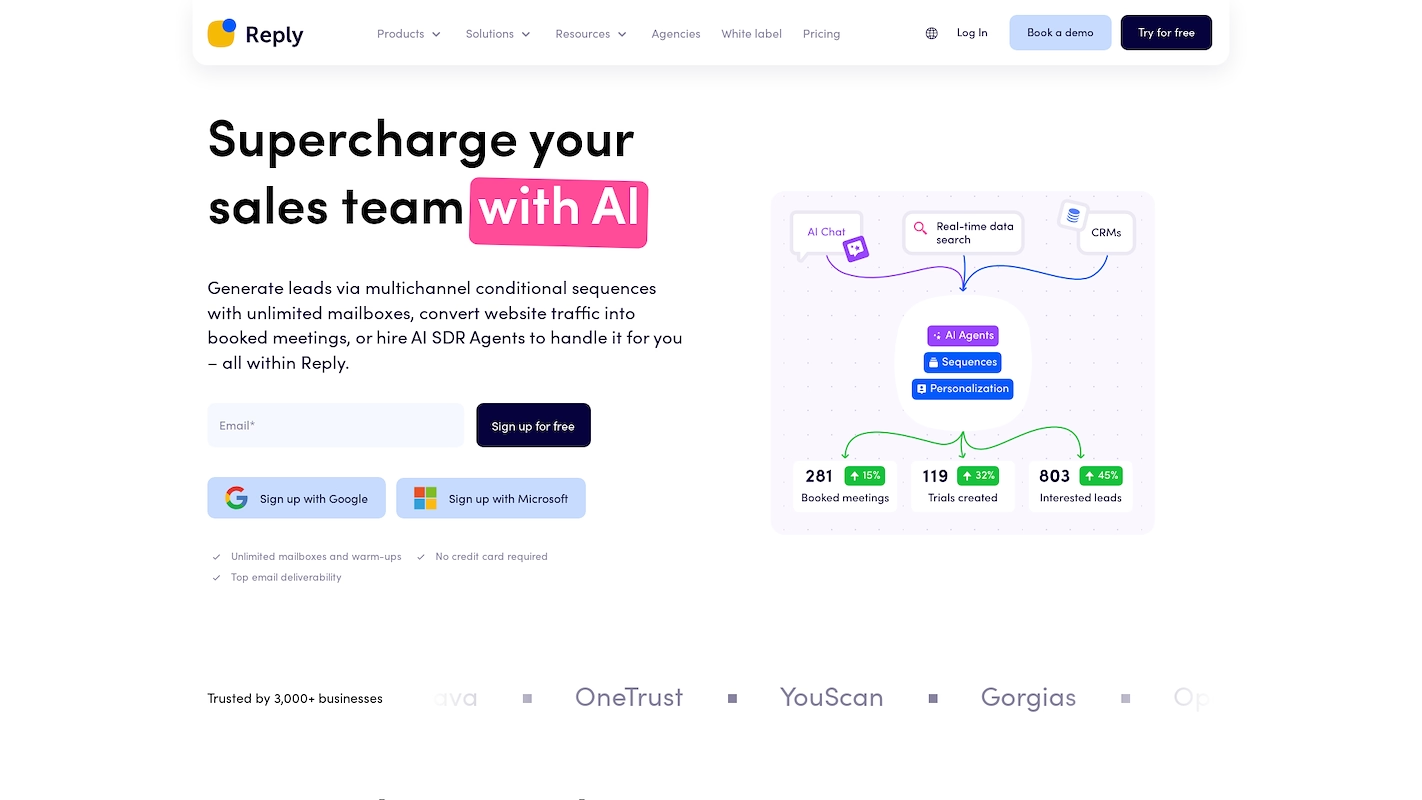
Reply.io is a sales engagement platform that uses AI to automate multichannel outreach. It helps teams find prospects, connect with them across email and social channels, and book meetings. The platform is a tool for outbound sales, with functions that support AI SDR and AI-driven call tasks.
Reply.io's Main Features
- Offers an AI SDR agent, Jason AI, that automates prospecting, message generation, reply handling, and meeting booking.
- Provides multichannel conditional sequences that combine email, LinkedIn, calls, SMS, and WhatsApp into a single flow.
- Includes a deliverability toolkit with over 30 items, such as an Email Health Checker and unlimited mailbox warm-ups.
- Uses AI Variables for paragraph-level personalization, which rewrites each email uniquely at scale.
How Reply.io Compares to AnyBiz
Average Review score: 4.6/5 stars based on 1,458 G2 reviews.
- Reply.io offers multichannel sequences that include email, SMS, and WhatsApp. This provides more communication channels compared to AnyBiz, which focuses on email and LinkedIn outreach.
- It includes a deliverability toolkit with email health checks and warm-ups. This gives users direct control over their sending reputation, a feature not highlighted in AnyBiz's automated system.
- The platform uses AI Variables for paragraph-level personalization to rewrite each email. This offers a deeper level of message customization than standard automation.
- Reply.io provides an AI chat for websites to capture leads. This is a distinct feature for inbound lead conversion, which is different from AnyBiz's outbound automation focus.
Reply.io vs. AnyBiz: Potential Downsides
- Reply.io's AI assists sales reps, but the team must still manage the outreach process. This is different from AnyBiz, which uses fully autonomous agents to run campaigns, reducing the need for direct team oversight.
- The tool operates on a fixed subscription price, which provides predictable costs. This is a contrast to AnyBiz's pay-for-results model, where your expenses are variable and scale with campaign success.
- Some teams may find the platform's broad feature set complex if their only goal is outreach automation. AnyBiz offers a more focused tool for that specific task, which can mean a simpler setup and user experience.
Budget and Pricing Considerations
Reply.io offers a fixed subscription model with plans starting at $49 per user monthly, providing predictable costs for budgeting. This contrasts with AnyBiz's pay-for-results structure, where expenses are variable and directly tied to campaign outcomes.
7) Lemlist
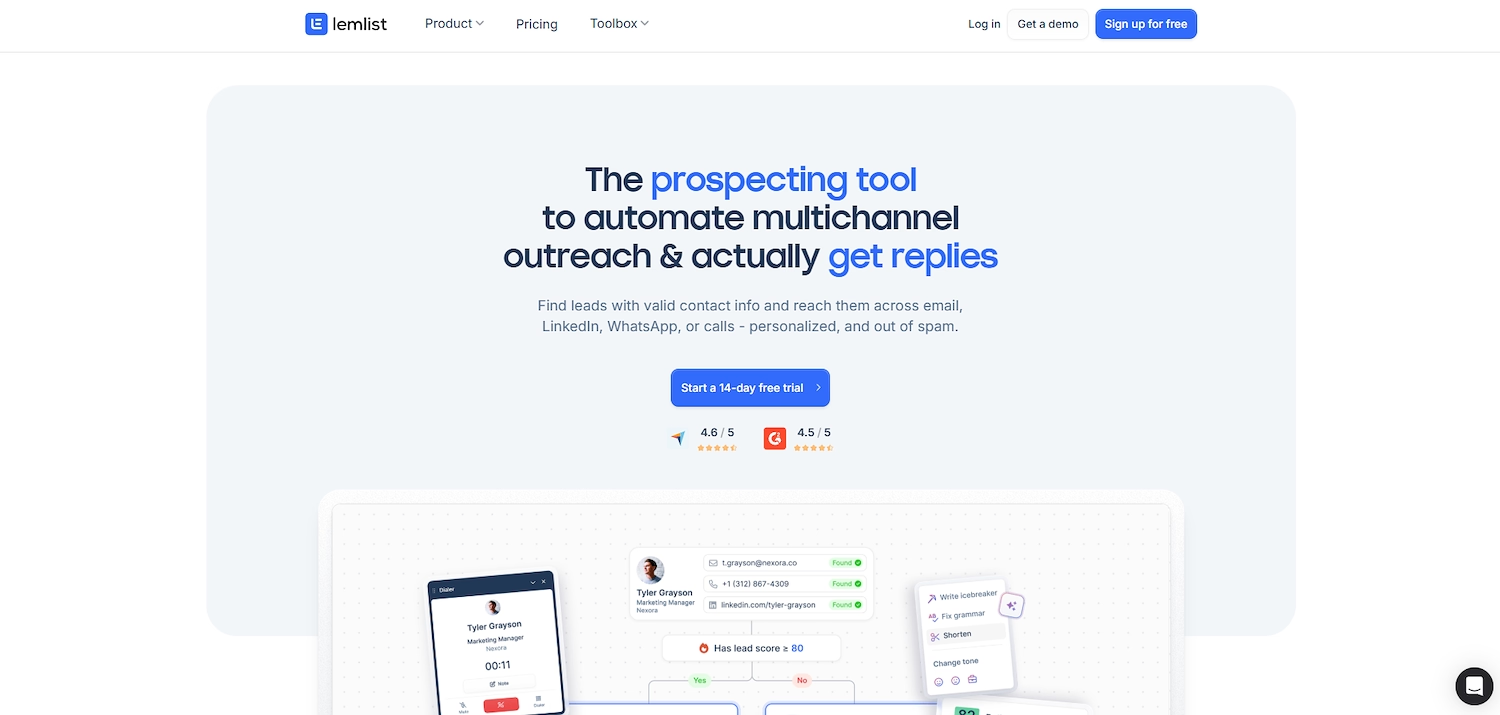
Lemlist is a sales engagement platform for multichannel outreach. It helps sales teams find prospects, personalize communication, and warm up email domains. The tool supports outbound sales campaigns with functions for AI SDR and AI cold call tasks.
Teams use it to connect with potential customers and secure meetings, with a focus on deliverability.
Lemlist's Main Features
- Builds multichannel sequences that combine email, LinkedIn, WhatsApp, and calls into a single automated flow.
- Personalizes outreach with dynamic variables for text, images, and custom landing pages.
- Includes a built-in tool, lemwarm, to warm up email domains and protect sender reputation.
- Provides a database of over 450 million B2B contacts for lead sourcing and data enrichment.
How Lemlist Compares to AnyBiz
Average Review score: 4.4/5 stars based on 276 G2 reviews.
- Lemlist builds multichannel sequences that include calls and WhatsApp. This provides more outreach channels compared to AnyBiz, which focuses on email and LinkedIn.
- It offers advanced personalization with dynamic images and custom landing pages. This is a different approach to message customization than the outreach automation of AnyBiz.
- The platform includes a built-in tool to warm up email domains. This gives users direct control over sender reputation, a function not specified for AnyBiz's automated system.
- Lemlist provides a database of over 450 million B2B contacts for lead sourcing. This is different from AnyBiz, which automates outreach using data you provide.
Lemlist vs. AnyBiz: Potential Downsides
- Lemlist requires a sales rep to manage outreach campaigns, even with its automation tools. This approach differs from AnyBiz, where autonomous agents handle the entire process, which reduces the team's direct workload.
- The platform includes many features like a contact database and email warm-up tools. For a team that only needs simple outreach automation, this might introduce unnecessary complexity compared to the focused function of AnyBiz.
- It operates on a fixed subscription price, so costs remain the same regardless of results. This is a contrast to AnyBiz's pay-for-results model, where your expenses directly connect to the outcomes of a campaign.
Budget and Pricing Considerations
Lemlist offers a fixed subscription model with plans ranging from a free tier to $79 per month for its Multichannel Expert plan. This predictable pricing contrasts with AnyBiz's variable pay-for-results structure, making Lemlist a better choice for teams that prioritize fixed budget planning.
8) Mailshake
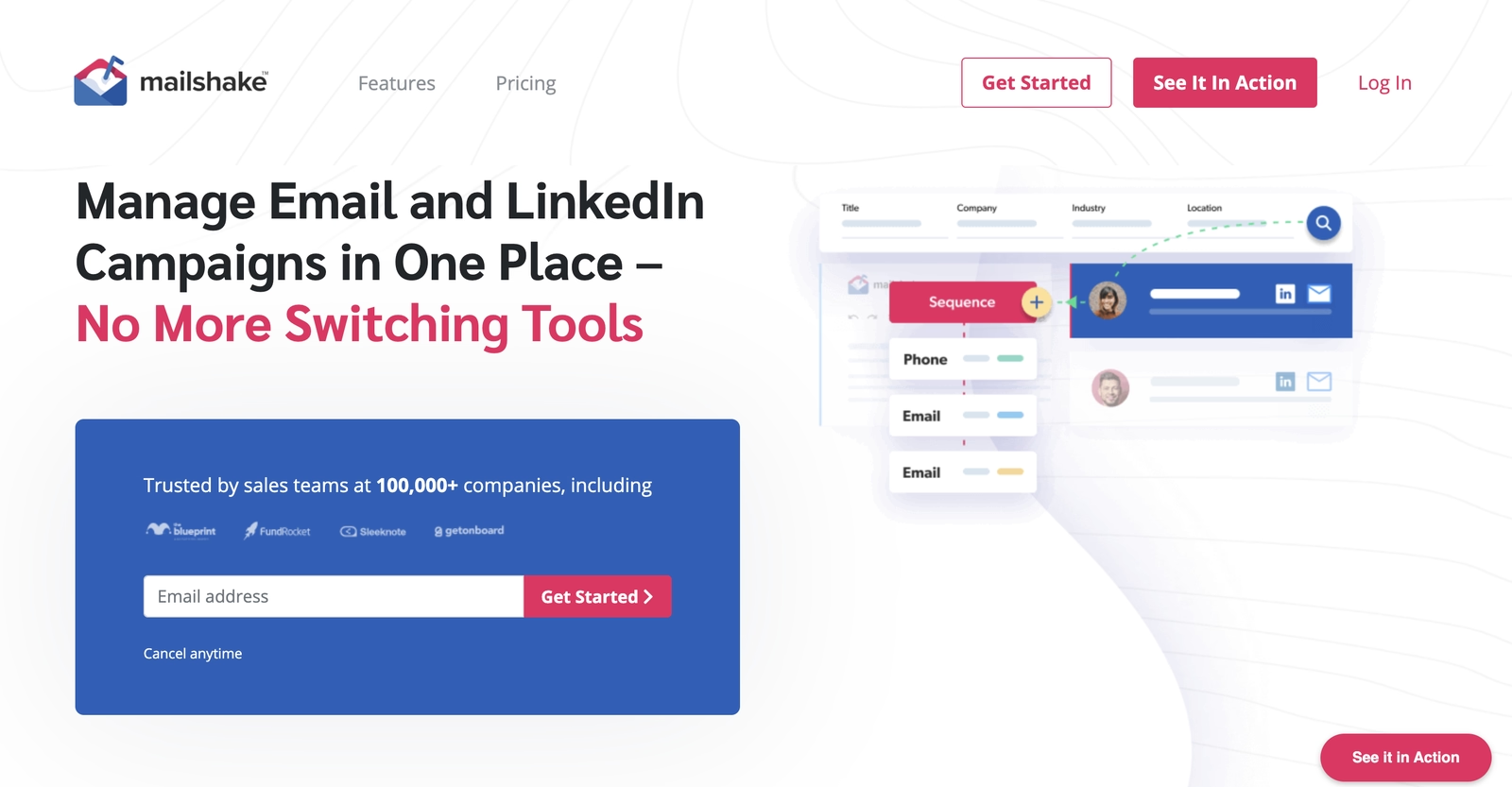
Mailshake is a sales engagement platform for cold outreach. It helps sales teams connect with prospects through phone, email, and social media. The tool automates sequences and supports AI SDR and AI cold call tasks for outbound campaigns.
Teams use it to generate leads and set appointments with potential customers.
Mailshake's Main Features
- Engages prospects across phone, email, and social media within a single sequence.
- Includes lead scoring to help prioritize outreach efforts.
- Schedules emails based on the best time of day to improve engagement.
- Manages tasks for phone and social media engagement within an automated workflow.
How Mailshake Compares to AnyBiz
Average Review score: 4.7/5 stars based on 326 G2 reviews.
- Mailshake includes lead scoring to help reps prioritize prospects. This is different from AnyBiz, which automates outreach without a specific lead scoring feature for the user.
- It adds phone calls to its automated sequences. This provides an additional outreach channel compared to AnyBiz, which focuses on email and LinkedIn.
- The platform schedules emails for the best time of day to improve engagement. This gives users control over send timing, unlike AnyBiz's fully automated process.
- Its task management feature helps reps organize phone and social media actions. This supports a rep-led workflow, while AnyBiz uses an autonomous agent to handle tasks.
Mailshake vs. AnyBiz: Potential Downsides
- Mailshake requires a sales rep to manage its outreach tools. This differs from AnyBiz, which uses autonomous agents to run the entire process. This means your team stays directly involved in campaign execution.
- The platform's wide range of features for reps can introduce complexity for teams that only need a dedicated outreach tool. AnyBiz presents a more focused solution, as its agents handle one specific function.
- It operates on a fixed subscription price, so costs are predictable but not tied to performance. This model contrasts with AnyBiz's pay-for-results structure, where expenses align directly with campaign outcomes.
Budget and Pricing Considerations
Mailshake offers fixed subscription plans, with its Email Outreach plan at $59 per month and Sales Engagement plan at $99 per month. This predictable pricing model contrasts with AnyBiz's variable pay-for-results structure. Mailshake is a suitable choice for teams that prioritize fixed budget planning, while AnyBiz aligns costs with campaign outcomes.
9) Groove
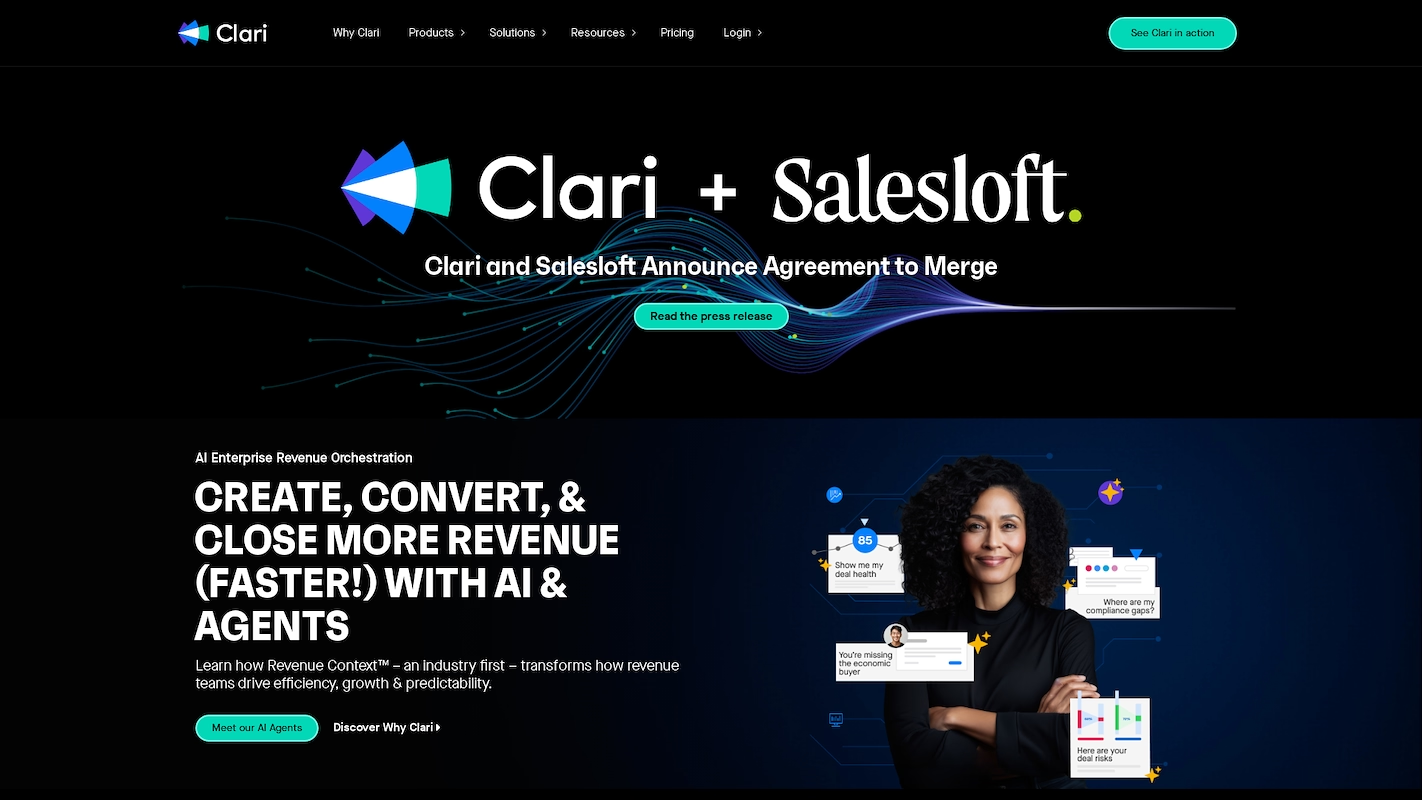
Groove is a sales engagement platform that automates sales workflows for revenue teams. It helps manage outreach across multiple channels and provides tools to track performance. The platform connects sales activities to business outcomes.
Common use cases include outbound campaigns and pipeline management. The system supports tasks for AI SDRs and AI cold calls, which helps teams connect with prospects and book meetings.
Groove's Main Features
- Manages customer support inquiries through a ticket and case management system.
- Converts incoming emails into support cases with an email-to-case function.
- Includes tools for internal discussion and notes to support team collaboration.
- Provides user, role, and access management to control platform permissions.
How Groove Compares to AnyBiz
Average Review score: 4.6/5 stars based on 193 G2 reviews.
- Groove provides a ticket and case management system for customer support. This offers a structured way to handle inquiries, a function not part of AnyBiz's outreach automation.
- It converts incoming emails into support cases. This function is designed for support teams, while AnyBiz uses email for automated outbound campaigns.
- The platform includes a shared inbox for teams to manage customer communication. This is different from AnyBiz, which automates individual outreach from an AI agent.
- Groove has tools for internal discussion and notes to help teams collaborate on support tickets. This contrasts with AnyBiz, where the AI agent handles tasks autonomously.
Groove vs. AnyBiz: Potential Downsides
- Groove is designed for customer support, so it lacks the autonomous AI sales agents that AnyBiz provides for outreach. This means your team must handle all lead generation tasks manually.
- The platform focuses on support ticket management and does not automate multichannel sales campaigns. This is different from AnyBiz, which runs outreach across email and LinkedIn without direct team involvement.
- Its features, like a shared inbox and case management, serve support teams. For sales teams that need to generate new leads, this tool does not offer the specialized top-of-funnel automation found in AnyBiz.
Budget and Pricing Considerations
Groove offers fixed subscription plans starting at $15 per user monthly, providing predictable costs for budget planning. This model differs from AnyBiz's pay-for-results structure, where expenses are variable and tied directly to campaign outcomes. For detailed pricing, visit Groove's official website.
10) Klenty
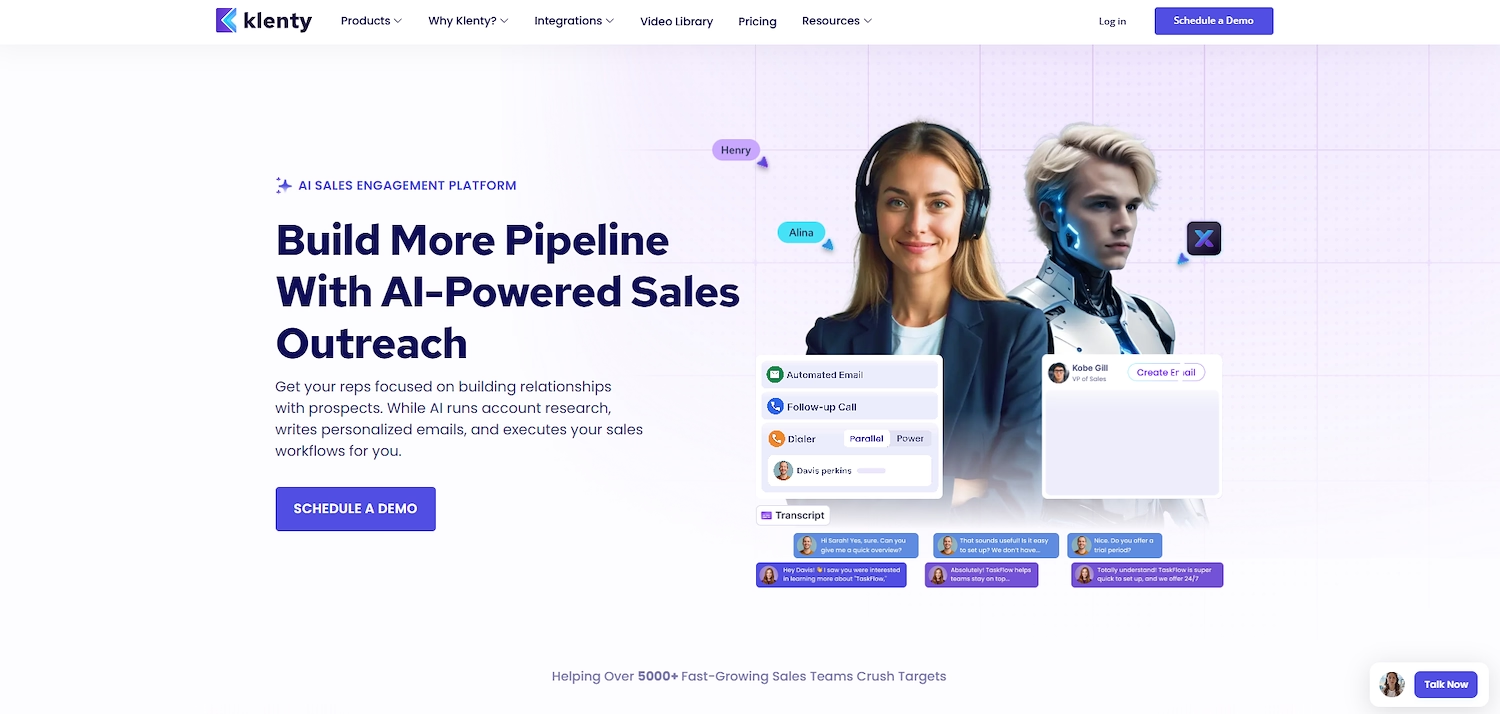
Klenty is a sales engagement platform for multichannel outreach. It helps sales teams connect with prospects across email, phone, and social media. The tool supports outbound campaigns with functions for AI SDR and AI cold call tasks.
Teams use it to build pipeline and book meetings with potential customers.
Klenty's Main Features
- Provides analytics on email performance, including open rates, link activity, and attachment activity.
- Offers email scheduling to control send times for outreach campaigns.
- Includes workflow management for creating and monitoring custom sales processes.
- Integrates with CRMs to help execute custom workflows and manage tasks.
How Klenty Compares To AnyBiz
Average Review score: 4.6/5 stars based on 387 G2 reviews.
- Klenty provides detailed analytics on email performance, including open and link activity. This gives users more direct insight into campaign results compared to the automated reports from AnyBiz's agent.
- It offers email scheduling, which gives users control over when outreach messages send. This is different from AnyBiz, where the AI agent manages the send schedule autonomously.
- The platform allows for custom workflow management that integrates with your CRM. This lets teams build and monitor their own sales processes, unlike AnyBiz, which uses a pre-set agent-driven system.
- This tool helps manage tasks within the sales process. This feature supports a rep-led workflow, which contrasts with the fully autonomous task execution by AnyBiz's AI agent.
Klenty vs. AnyBiz: Potential Downsides
- Klenty requires a sales rep to manage its outreach automation tools. This approach is different from AnyBiz, where autonomous agents run the entire process, which may mean your team keeps a higher direct workload.
- It operates on a fixed subscription price, so costs are predictable but not tied to performance. This model contrasts with AnyBiz's pay-for-results structure, where expenses align directly with campaign outcomes.
- The platform includes many features, which some teams might find complex if they only need a dedicated outreach tool. AnyBiz presents a more focused solution, as its agents handle one specific function.
Budget and Pricing Considerations
Klenty offers fixed subscription plans starting at $50 per user monthly for its Startup tier, rising to $100 for the Pro plan. This predictable pricing contrasts with AnyBiz's variable pay-for-results model. Klenty is a better fit for teams that prioritize fixed budget planning, while AnyBiz aligns costs directly with campaign success.
Which One Should You Go With?
The right AnyBiz alternative depends on your team's specific needs, budget, and sales process. This guide reviewed several top options to help you compare features and find a suitable fit for your goals.
If your goal is to automate the sales process with autonomous agents rather than just assisting reps, 11x is a strong contender. Its digital workers manage tasks like outreach and lead qualification, which can expand your sales capacity without growing your team.




